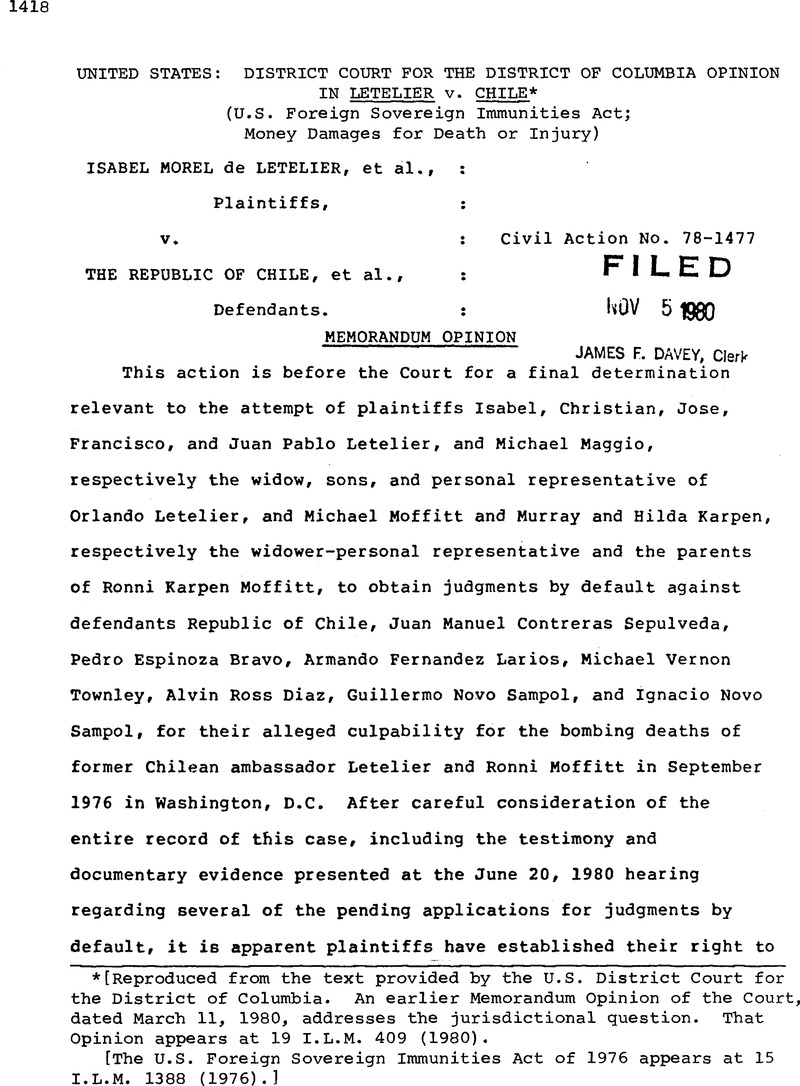No CrossRef data available.
Published online by Cambridge University Press: 04 April 2017

[Reproduced from the text provided by the U.S. District Court for the District of Columbia. An earlier Memorandum Opinion of the Court,dated March 11, 1980, addresses the jurisdictional question. ThatOpinion appears at 19 I.L.M. 409 (1980).[The U.S. Foreign Sovereign Immunities Act of 1976 appears at 15 I.L.M. 1388 (1976).]
1 In this complaint plaintiffs have asserted the following causes of action: 1) conspiracy to deprive Orlando Letelier and RonniMoffitt of their constitutional rights in violation of 42 U.S.C.S 1985 (1976); 2) assault and battery; 3) negligenttransportation and detonation of explosives; 4) tortiousactivities in violation of the law of nations resulting in deathto Orlando Letelier and Ronni Moffitt; and 5) tortious assaultupon Orlando Letelier, an internationally protected person pursuant to 18 U.S.C. S 1116 (1976), that was the proximate causeof his death and the death of Ronni Moffitt.
2 Also named as defendants in the first amended complaint to this action were the Centro Nacional de Informaciones (CNI) (formerlyDireccion de Intelligencia Nacionale (DINA)), Virgilio PazRomero, Jose Dionisio Suarez Esquivel, and John Does One throughTen. For various reasons and with plaintiffs' acquiesence all ofthese defendants have been dismissed from this action, withoutprejudice.
3 Following a five-week trial by jury in early 1979, defendants Ross and Guillermo Novo were convicted of various chargesrelating to the deaths of Orlando Letelier and Ronni Moffitt,including first degree murder, D.C. Code S 22-2401 (1973), murderof a foreign official, 18 U.S.C. SS 1111, 1116 (1976), andconspiracy to murder a foreign official, id. S 1117, whileIgnacio Novo was convicted of making false declarations to thegrand jury, id. S 1623, and misprison of a felony, _id_. 54. Allthree were sentenced to substantial prison terms. Recently,however, the convictions of all three defendants were overturned by the United States Court of Appeals for the District ofColumbia Circuit. United States v. Sampol, Nos. 79-1541, 79-1542, 79-1808 (D.C. Cir. Sept. 15, 1980). The convictions ofRoss and Guillermo Novo were reversed because of theintroduction of the testimony of government informants who wereinmates in the same cellblocks with Guillermo Novo and Ross whilethey were imprisoned awaiting trial, id. slip op. at 5-32;Ignacio Novo's conviction was reversed because of the failure ofthe trial court to grant him a separate trial on the charges against him, id. at 32-51. As evidence in support of their applications for defaultjudgments, the plaintiffs introduced approximately 160 exhibits, many of which were copies of exhibits introduced at the trial ofthe Novos and Ross, but none of these were related to the matterscited by the Court of Appeals as compelling the reversal of thethree convictions. Also introduced were copies of the sworntestimony of defendant Michael Vernon Townley given at thecriminal trial. Although defendant Townley currently is servinga criminal sentence for his involvement in the Letelier andMoffitt killings at an undisclosed location under the aegis of the United States Marshals' Witness Protection Program, becauseof the clear and present danger to Mr. Townley and to otherpersons that would have been precipitated by bringing him beforethe Court, he has been considered unavailable. Consequently hissworn testimony during the criminal proceedings institutedagainst the Novos and Ross, which was not in any way questionedby the Court of Appeals or involved as a basis for the reversalof the convictions, has been considered in determining thepropriety of the entry of the judgments by default in thiscase. Fed. R. Evid. 804(a)(5). The testimony of the governmentinformers that the Court of Appeals found to have been improperlyadmitted at the criminal trial has not been considered by this Court.
4 Although plaintiffs have sought a default judgment against defendant Ignacio Novo Sampol as well, it is apparent from theevidence presented to the Court that his knowledge of andinvolvement in the murders occurred only after they had beenaccomplished, making any finding of civil liability inappropriateas it relates to Ignacio Novo. Accordingly, the Court willvacate the default entered against that defendant and dismiss himfrom this action.
5 Although the June 20, 1980, hearing at which evidence relevant to damages was presented by plaintiffs was before the entry ofdefaults against defendants Juan Manuel Contreras Sepulveda,Pedro Espinoza Bravo, and Armando Fernandez Larios, they havebeen sued in this action as joint tortfeasors along with theother parties against whoa defaults were pending on June 20,1980. Plaintiffs have requested that the evidence adduced atthat June hearing be applied to the question of damages againstContreras, Espinoza,and Fernandez and will be BO consideredwithout holding a separate, duplicative hearing. See Order of October 23, 1980.